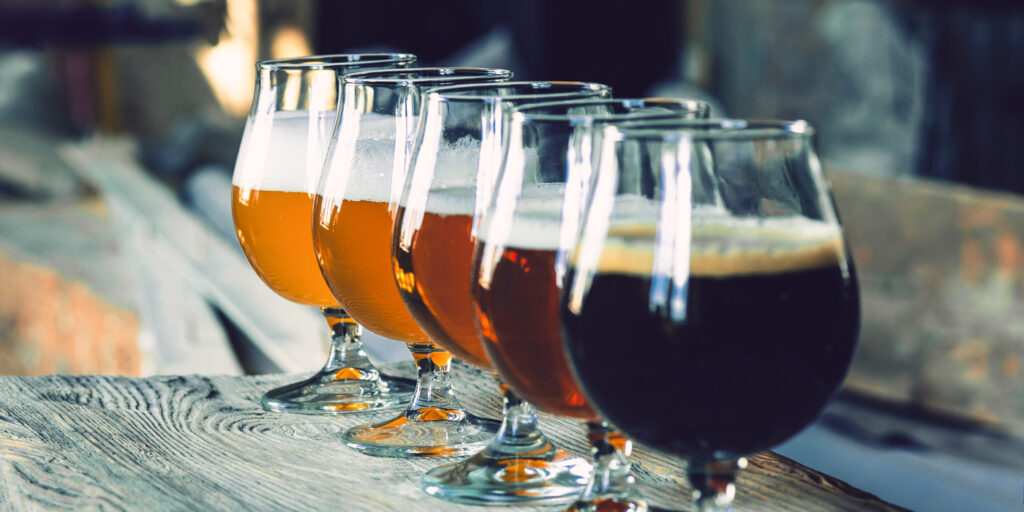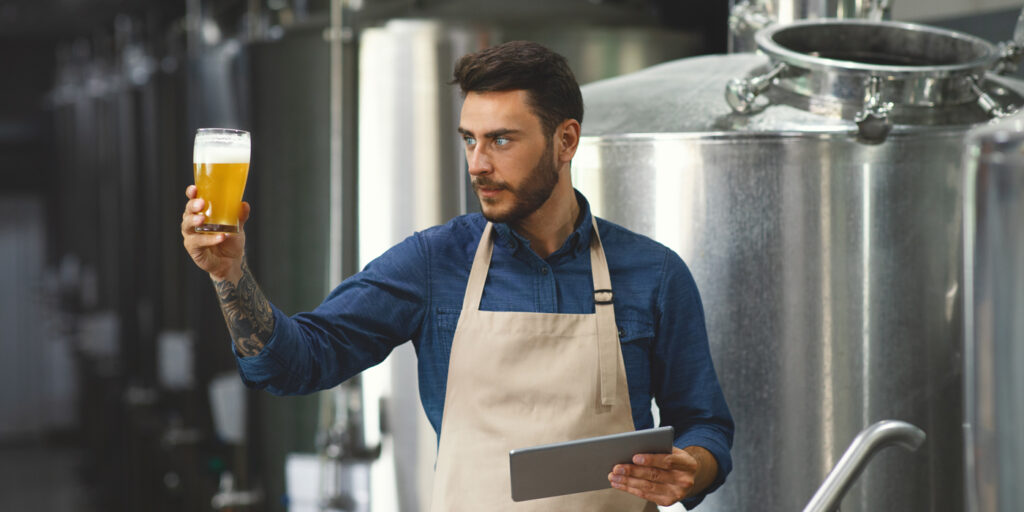Should We Really Be Trying to Market Beer as Sustainable?
Brewing Beer Sustainability
In May 2023, Bristol’s Wiper & True became the second small brewery in the UK to install a machine designed to capture, and recycle carbon dioxide produced during the brewing process. The first was Gadd’s Brewery in Kent, which installed its machine the previous autumn, and owner Eddie Gadd was reportedly on site in Bristol to help Wiper & True commission their own device.
Brewing, and its associated processes, requires a lot of carbon dioxide – not just any old CO2 either, but gas that has been ‘scrubbed’ so that it is safe to use in industrial food production, (which has to be one of the least romantic, but most accurate ways to describe making beer). The vast majority of food grade CO2 used by British breweries is a byproduct of fertiliser production – itself the antithesis of what we might refer to today as ‘sustainable’. CO2 has many uses around the brewery, as well as in hospitality, the most obvious of which being when it is used to carbonate beer (so that it becomes fizzy) or to dispense it via keg, under top pressure.

These are just some of its functions. Even breweries who predominantly produce cask ale, or naturally carbonated (‘spunded’) lagers, require carbon dioxide. As a rule, beer hates oxygen, as this will cause it to spoil, so cans, casks, kegs and bottles are typically purged with CO2 before they are filled to reduce the chances that the beer that fills them will go to waste. On a larger scale, it’s used to purge tanks after they are cleaned and before they are filled with yet to be fermented beer. If you consider that there are about 1900 breweries in operation within the UK, and how much beer is physically being made, that’s a lot of gas required, created through a wholly environmentally unfriendly process.
While it’s great news that breweries like Gadd’s and Wiper & True are moving towards technology that will allow them to capture and reuse CO2 produced naturally in the brewing process, lowering their own carbon footprints as they do so, the reality is that the technology is prohibitively expensive. Before Gadd’s installed its machine, the smallest brewery in the UK to use the technology was the Wellpark Brewery in Glasgow, which produces several beers, including Tennents Lager. It will be some time before even a fraction of the small breweries in the UK will be able to access this technology for themselves.
The production and use of carbon dioxide is just one a host of intensive industrial processes beer is reliant upon for its production. In fact, during January 2023 the British government recognised breweries as energy intensive businesses under its energy bill discount scheme, due to the fact their energy usage and its relative cost is so high.
And yet, amid both the energy crisis and the looming threat of climate change, breweries are increasingly under pressure to market themselves as ‘sustainable’. As a result, a growing number of breweries are leaning on their environmental credentials as a core strategy, whether through the release of products billed as ‘carbon neutral’ or by applying for B Corp certification, which seeks to promote businesses that achieve “high standards of social and environmental performance, transparency, and accountability.” Although, successful applicants are still required to pay a yearly subscription fee to parent company B Labs in order to advertise the fact.
One brewery, Scotland’s BrewDog, has taken this marketing push a step further, claiming that as a business (one that operates four large breweries and more than 100 bars internationally) it is in fact carbon ‘negative’ – meaning that it claims to capture more carbon dioxide than it produces. However, based on the size of the operation and the immense volume of beer it produces, I find this claim very difficult to believe. In fact I feel that most attempts by breweries to market themselves, and beer production as a whole as ‘sustainable’ to potentially be a form of greenwashing.
Creating a sustainable future for this planet, and ourselves as its inhabitants, is vital, and I believe brewing has an important role to play in that. However, I feel that the brewing industry has some harsh truths to face and acknowledge before it can genuinely present itself as sustainable. Until that happens, my greatest worry is that consumers trying to do their bit for the environment by only purchasing beer marketed as being better for it are, potentially, being lied to.

Beer and brewing is inescapably reliant on industrial agriculture. While the idea of beer being a product of the land is often heavily romanticised (and I admit to being a writer who perpetuates this idea) the truth the volume of barley alone and the industrial nature in which it is produced would make it difficult for most breweries to genuinely certify themselves as carbon neutral, let alone negative. UK farmers produce 2 million tons of barley annually, with 55% of this destined for the distilling industry, and around 31% ending up in the hands of British breweries. The remainder is exported, or used as animal feed (itself contributing towards its carbon footprint.)
If you consider the sheer logistics in moving that weight of barley around, either by tractor, truck or boat, then add to that consideration that malt itself undergoes a fairly intensive industrial process to convert it into a suitable product for brewing, you’ve got a lot of carbon on your hands. Then factor in beer’s other ingredients: water, likely treated and processed, yeast, produced in a laboratory and then cold chained to its final destination. Then there are hops, the vast majority of which (around 47%) are produced in the United States. Hops need to be processed before they can be used, which involves kilning, and once packaged, they are shipped, thousands of miles, to the breweries in the UK who use them.
Even before you’ve turned the lights on in the brewery, and started to heat up your hot liquor tank, the beer you’re making has a vast carbon footprint. Then you come to the brewing process itself, which is essentially heating stuff for a few hours, then cooling it down quickly, and then keeping it very cold using a large scale refrigeration system for several weeks in a row. Not to mention the entire process produces carbon dioxide, which as we’ve already discussed, most breweries do not have the means to capture and reuse.
Then you’ve got to ship it, and that means more fossil fuels burned as you drive it up and down the country, before it ends up in a bar, itself requiring a large amount of energy to operate. Carbon negative? You are having a bubble, mate.
Look, I may be playing devil’s advocate a little too much here, but I feel that when it comes to discussions around sustainability it’s beneficial to be as open and honest as possible. In truth there are some excellent strides being made in making the production of beer more sustainable, CO2 recapture being just one example. Modern, highly energy efficient brewing systems, such as those manufactured by Brewiks are another. Then there are biofuel systems, powered by waste gases produced in the brewing process, solar and wind power, and reed bed filtration systems that allow wastewater to be safely returned to the environment. These should be acknowledged, celebrated even.
But I also consider that you cannot market beer as being genuinely sustainable until every process involved in its production – from agriculture, to production, logistics and dispense – also becomes sustainable. If breweries desire to champion sustainability, then they should be doing this at every part of the supply chain that serves them, and not just in little pockets that make for great marketing.
I believe that we are heading in the right direction in terms of ensuring that beer production is becoming more sustainable. But I feel that, in order to make further, genuinely progressive strides, deeper conversations need to be had about the global, industrial nature of beer production. Who knows, maybe this is the start of some.
—Matthew Curtis